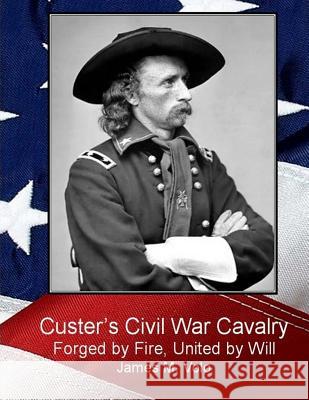Custer's Civil War Cavalry: Forged by Fire, United by Will » książka
Custer's Civil War Cavalry: Forged by Fire, United by Will
ISBN-13: 9781492865414 / Angielski / Miękka / 2013 / 210 str.
In spite of hardships and privations, the Confederate cavalry had excellent morale throughout the war. The mud, the cold, the hunger, the wet bivouacs, the brutally long marches, did not appear to detract from the glamour of its service. Morale grew and remained high for the best of reasons: unbroken and often spectacular success, brilliant leadership, and exploits that struck the imagination. It was far otherwise for the Federal horsemen. It was apparent to the men themselves that they were being wasted and their efforts frittered away in employment that gave them no chance to perform creditably. There is only a scant record of cavalry engagements above the level of mere skirmishes in which the Federal horsemen were not worsted before the summer of 1863. The spring reorganization of 1863 was the start of a new era for the Federal cavalry. It began to prove itself in a succession of engagements: Kelly's Ford, Brandy Station, Buford's fight on the first day at Gettysburg, and Gregg's and Custer's on the third day. There were failures still, failures of leadership for the most part, but no longer did the Confederates automatically have the better of the Federals. There was a new spirit in the air, and both the Confederate and the Federal cavalry knew it. The purpose of this selection is to document the character and exploits of the Federal cavalry during the Civil War-the cavalry that George Armstrong Custer knew and in which he served. These mounted encounters will now be reported with emphasis from the Federal point of view, and the intra-service rivalries will be those of Federal officers and administrations rather than Confederate ones. Also distinguished among Federal cavalry commanders in these pages are Philip St. George Cooke, George Stoneman, Alfred Pleasonton, Phil Sheridan, John Buford, J. Irvin Gregg, David M. Gregg, H. Judson Kilpatrick, Elon Farnsworth, and many others. This is also the story of Custer's famous Michigan Brigade (1st, 5th, 6th, and 7th Michigan Volunteer Cavalry and Battery M, 2nd US Artillery), the only Federal cavalry brigade to hail from a single state. The Michigan Brigade fought in every major campaign of the Civil War after it had been established.
Zawartość książki może nie spełniać oczekiwań – reklamacje nie obejmują treści, która mogła nie być redakcyjnie ani merytorycznie opracowana.











